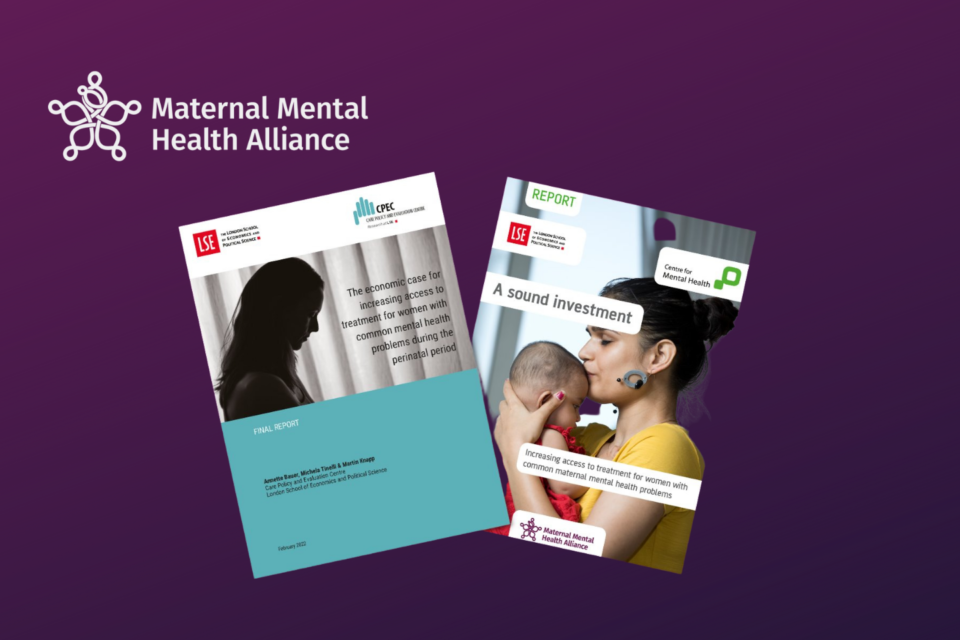Midwives and health visitors at the heart of a new model of care for women with common maternal mental health problems
It is known that 1 in 5 women and birthing people will experience maternal mental health problems and they are one of the leading causes of death during pregnancy and the first postnatal year. It is also apparent that these rates have increased over the COVID-19 pandemic. In this article Amy Tubb, Communications Lead at the Maternal Mental Health Alliance, introduces a new family- centred integrated model of maternal mental health care with midwives and health visitors at the heart.
The research
In a new study commissioned by the Maternal Mental Health Alliance (MMHA), researchers from London School of Economics and Politics (LSE) evaluated the economic viability of reforming current treatment for pregnant and postnatal women experiencing common maternal mental health problems such as depression and anxiety.
The ‘integrated model of care’ explored in LSE’s report, ‘The economic case for increasing access to treatment for women with common mental health problems during the perinatal period’, focuses on the essential role of midwives and health visitors in identifying women who are feeling stressed, anxious, worried or depressed, and facilitating treatment for them. More time would be given to accurately assess mental wellbeing at every routine contact and consider suitable next steps – in a similar way to testing for and treating physical conditions such as diabetes or high blood pressure.
“This report shines a very welcome light on the vital role of midwives and health visitors in identifying women with mental health problems during and after pregnancy and facilitating women’s access to treatment. It is fantastic to see a fully researched, costed model of care that would improve the lives of these women and their loved ones and also carry significant savings. With such clear evidence of human benefit and a sound investment, it is vital that we make it easier for pregnant women and new mums to access mental health support during routine contacts with their midwives and health visitors.”
Luciana Berger, Chair of the MMHA
Delivering a family-centred ‘integrated model of care’
Resources needed to set up and provide this model of care for women and families – namely employment and training costs – are measured against their economic return. Researchers concluded that changes to current practice could lead to cost savings for the NHS over 10 years of £52 million and improvements in women’s quality of life estimated at £437 million. In total, this is a net benefit of £490 million over 10 years.
“Building on our 2014 study, which highlighted the human suffering and costs linked to perinatal mental health problems, our new study shows that there are affordable ways for increasing access to treatment for women with common mental health problems that are leading to substantial quality of life improvements.”
Annette Bauer, lead researcher and Assistant Professorial Research Fellow at LSE
Researchers showed that greater parity between maternal mental health physical healthcare is not only desirable but cost-effective. In contrast, they found that current practice leaves many women without access to evidence-based treatment when and where they need it.
Implications for policy and practice
Policy analysis by MMHA member, Centre for Mental Health, determines that integrated service provision is the logical and economical next step in the evolution of perinatal mental health care in the UK. It would close a major gap in services and ensure women get timely access to help for their mental health needs.
“Maternal mental health difficulties are common and can be serious. Every contact with a midwife or health visitor is an opportunity to offer support quickly when it’s needed. But shortages of both have made that difficult, and too many women miss out on effective early help for common mental health problems. Supporting midwives and health visitors with the training and time to meet women’s mental health needs is a sound investment that could make a difference to many thousands of women and their families.”
Sarah Hughes, Chief Executive of Centre for Mental Health
For the suggested model to be effective, it must address existing inequalities in women’s experiences of maternity and mental health care. Women of colour for example, have poorer outcomes from maternity services, including higher mortality rates. It will therefore be vital that integrated service provision is developed in an equitable way, actively seeking to meet the needs of all women, including those who are currently less well-served.
Making all care count
Through the ‘Make all care count’ campaign, the MMHA is calling for ALL women and families across the UK to have equitable access to comprehensive, high-quality maternal mental healthcare, including and beyond specialist services.
“There has been fantastic investment into specialist perinatal mental health services across the UK in recent years. This has been transformative for women, babies and families affected by the most severe and complex mental health problems, but there are still major gaps for those who don’t need such highly specialised care. This research provides important evidence of a practical, cost-effective solution for addressing one of those gaps in maternal mental health services and improving the lives of so many in this generation and the next.”
Dr Alain Gregoire, Consultant Perinatal Psychiatrist and MMHA’s Honorary President
Written by Amy Tubb, Communications Lead at MMHA
The MMHA is a UK-wide charity and network of over 100 organisations dedicated to ensuring women and families affected by perinatal mental health problems have equal access to high quality, comprehensive care.
- Website – org
- Twitter and Instagram – @MMHAlliance


